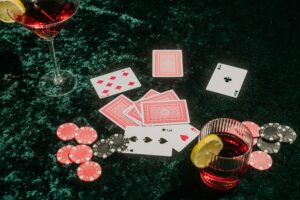Master of the Poker Table – A Professional Journey


In the high-stakes world of professional poker, becoming a master isn’t just about playing the cards you’re dealt. It’s about playing the people across from you. This article takes a deep dive into the journey of a professional poker player, exploring the nuances, strategies, and relentless pursuit of excellence that define success at the poker table.
Early Beginnings
Every poker master starts as a novice, learning the basic rules and hands of the game. However, what sets future professionals apart is often evident early on. They exhibit acute attention to detail, exceptional memory, and an inherent ability to calculate odds and read subtle cues. For many, poker starts as a casual hobby, perhaps learned at family gatherings or among friends. However, the transition to taking the game seriously involves a love for the game and a recognition of its potential as a mental and psychological battleground.
Learning and Development
Serious players quickly learn that poker is not merely gambling; it’s a game of skill, strategy, and psychology. They invest countless hours studying various methods, from the basic to the complex. This includes understanding different playing styles, ranging from conservative to aggressive, and knowing when to apply them. Books, online courses, and videos from seasoned professionals become staples in their educational journey. Moreover, many up-and-coming poker players seek mentors to help refine their strategies and decision-making processes.
The Role of Experience
As in any craft, theoretical knowledge in poker must be tempered with practical experience. This is often gained through participating in numerous tournaments and cash games. Experience at the table teaches lessons that no book can, such as managing pressure, handling losses, and the importance of timing. The grind of playing regularly also hones a player’s ability to stay focused for long periods, a crucial skill in tournaments that can last for many hours or even days.
Psychological Resilience
Building psychological resilience is one of the most critical aspects of a poker professional’s development. The best players develop a mental toughness that allows them to remain undisturbed by bad beats or high-stress situations. This mental resilience is cultivated through experiences of winning and losing large sums of money and learning to maintain composure regardless of the problem.
Advanced Strategies
As players progress, they learn more advanced poker strategies, such as bluffing, pot odds, and the importance of position at the table. Mastering these techniques involves a deep understanding of mathematics and human behavior. A professional player studies opponents to detect patterns or tells in their actions, gaining insights into their hands while meticulously controlling their tells.
The Role of Body Language
Understanding and controlling body language go hand in hand with psychological warfare. Professionals are adept at reading their opponents’ body language and meticulously controlling their expressions and gestures. This poker face is about hiding reactions and projecting confidence or doubt when strategically beneficial.
Technology and Tools
Modern poker professionals also leverage technology to gain an edge. This includes using software to analyze past games and track opponents’ statistics. Online poker platforms have become a valuable tool for practicing strategies without the higher stakes of large tournaments.
Staying Current
Professional poker is ever-evolving, and staying current with the latest theories, strategies, and technological advances is crucial. Experienced players often participate in forums, attend seminars, and keep up with new literature to ensure they do not fall behind in the game’s dynamic landscape.
Health and Lifestyle
Successful poker professionals also recognize the importance of physical and mental health in their performance. Regular exercise, a healthy diet, and adequate rest are all crucial for maintaining focus and emotional control during the intense concentration required in tournaments.
The Reward
While the journey to becoming a master of the poker table is fraught with challenges, it is also gratifying. Apart from the potential financial gains, the valid reward for many professionals is the thrill of the competition, the satisfaction of personal growth, and the joy of mastering a game that combines intellect, psychology, and chance in equal measure.
The path to becoming a master of the poker table is complex and demanding. It requires a sharp mind, strategic thinking, strong character, and psychological depth. For those who rise to the challenge, professional poker offers a potential career and a lifelong journey of personal and psychological exploration.

